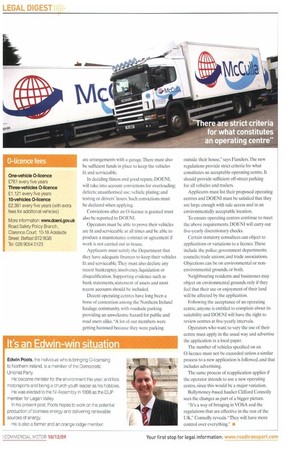0-licence fees
Page 32

If you've noticed an error in this article please click here to report it so we can fix it.
One-vehicle 0-licence £761 every five years Three-vehicles 0-licence £1,121 every five years 10-vehicles 0-licence £2.381 every five years (with extra fees for additonal vehicles)
More information: www.doeni.gov.uk Road Safety Policy Branch, Clarence Court, 10-18 Adelaide Street, Belfast BT2 8GB
Tel: 028 9054 0123 are arrangements with a garage. There must also be sufficient funds in place to keep the vehicles fit and serviceable.
In deciding fitness and good repute, DOENI, will take into account convictions for overloading; defects unauthorised use; vehicle plating; and testing or drivers' hours. Such convictions must be declared when applying.
Convictions after an 0-licence is granted must also be reported to DOENI.
Operators must be able to prove their vehicles are fit and serviceable at all times and be able to produce a maintenance contract or agreement if work is not carried out in-house.
Applicants must satisfy the Department that they have adequate finances to keep their vehicles fit and serviceable, They must also declare any recent bankruptcy, insolvency, liquidation or disqualification. Supporting evidence such as bank statements, statement of assets and most recent accounts should he included.
Decent operating centres have long been a bone of contention among the Northern Ireland haulage community, with roadside parking providing an unwelcome hazard for public and road users alike. "A lot of our members were getting harassed because they were parking outside their house," says Flanders. The new regulations provide strict criteria for what constitutes an acceptable operating centre. It should provide sufficient off-street parking for all vehicles and trailers.
Applicants must list their proposed operating centres and DOENI must be satisfied that they are large enough with safe access and in an environmentally acceptable location.
To ensure operating centres continue to meet the above requirements, DOENI will carry out five-yearly discretionary checks.
Certain statutory consultees can object to applications or variations to a licence. These include the police; government departments; councils trade unions; and trade associations. Objections can be on environmental or nonenvironmental grounds, or both.
Neighbouring residents and businesses may object on environmental grounds only if they feel that their use or enjoyment of their land will be affected by the application.
Following the acceptance of an operating centre, anyone is entitled to complain about its suitability and DOENI will have the right to review centres at five-yearly intervals.
Operators who want to vary the use of their centre must apply in the usual way and advertise the application in a local paper.
The number of vehicles specified on an 0-licence must not be exceeded unless a similar process to a new application is followed, and that includes advertising.
The same process of reapplication applies if the operator intends to use a new operating centre, since this would be a major variation.
Ballymoney-based haulier Clifford Connolly sees the changes as part of a bigger picture.
"It's a way of bringing in VOSA and the regulations that are effective in the rest of the UK," Connolly reveals. "They will have more control over everything." to








































































































































